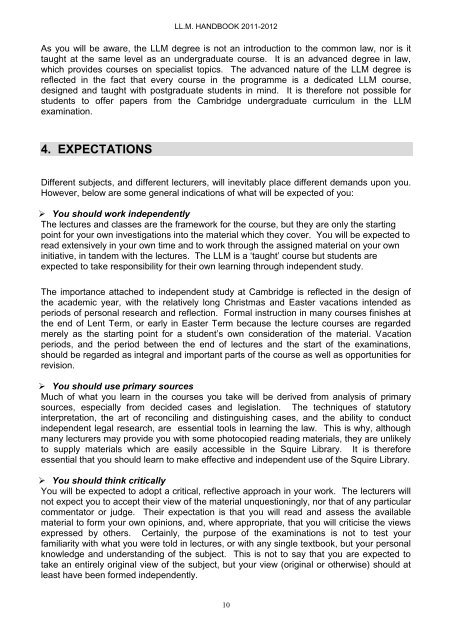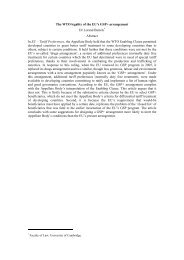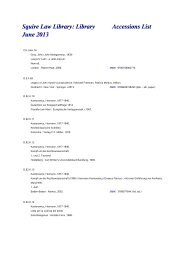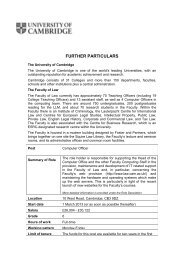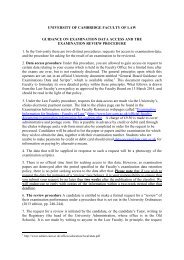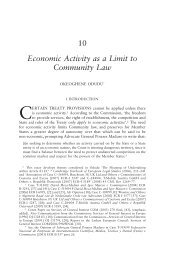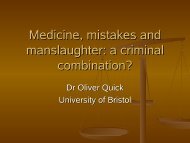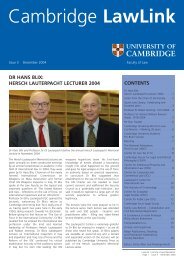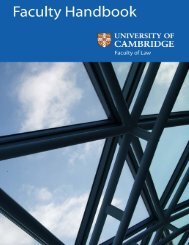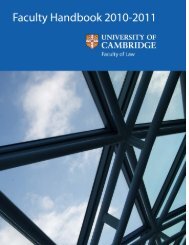start the download - Faculty of Law - University of Cambridge
start the download - Faculty of Law - University of Cambridge
start the download - Faculty of Law - University of Cambridge
Create successful ePaper yourself
Turn your PDF publications into a flip-book with our unique Google optimized e-Paper software.
LL.M. HANDBOOK 2011-2012As you will be aware, <strong>the</strong> LLM degree is not an introduction to <strong>the</strong> common law, nor is ittaught at <strong>the</strong> same level as an undergraduate course. It is an advanced degree in law,which provides courses on specialist topics. The advanced nature <strong>of</strong> <strong>the</strong> LLM degree isreflected in <strong>the</strong> fact that every course in <strong>the</strong> programme is a dedicated LLM course,designed and taught with postgraduate students in mind. It is <strong>the</strong>refore not possible forstudents to <strong>of</strong>fer papers from <strong>the</strong> <strong>Cambridge</strong> undergraduate curriculum in <strong>the</strong> LLMexamination.4. EXPECTATIONSDifferent subjects, and different lecturers, will inevitably place different demands upon you.However, below are some general indications <strong>of</strong> what will be expected <strong>of</strong> you:‣ You should work independentlyThe lectures and classes are <strong>the</strong> framework for <strong>the</strong> course, but <strong>the</strong>y are only <strong>the</strong> <strong>start</strong>ingpoint for your own investigations into <strong>the</strong> material which <strong>the</strong>y cover. You will be expected toread extensively in your own time and to work through <strong>the</strong> assigned material on your owninitiative, in tandem with <strong>the</strong> lectures. The LLM is a ‘taught’ course but students areexpected to take responsibility for <strong>the</strong>ir own learning through independent study.The importance attached to independent study at <strong>Cambridge</strong> is reflected in <strong>the</strong> design <strong>of</strong><strong>the</strong> academic year, with <strong>the</strong> relatively long Christmas and Easter vacations intended asperiods <strong>of</strong> personal research and reflection. Formal instruction in many courses finishes at<strong>the</strong> end <strong>of</strong> Lent Term, or early in Easter Term because <strong>the</strong> lecture courses are regardedmerely as <strong>the</strong> <strong>start</strong>ing point for a student’s own consideration <strong>of</strong> <strong>the</strong> material. Vacationperiods, and <strong>the</strong> period between <strong>the</strong> end <strong>of</strong> lectures and <strong>the</strong> <strong>start</strong> <strong>of</strong> <strong>the</strong> examinations,should be regarded as integral and important parts <strong>of</strong> <strong>the</strong> course as well as opportunities forrevision.‣ You should use primary sourcesMuch <strong>of</strong> what you learn in <strong>the</strong> courses you take will be derived from analysis <strong>of</strong> primarysources, especially from decided cases and legislation. The techniques <strong>of</strong> statutoryinterpretation, <strong>the</strong> art <strong>of</strong> reconciling and distinguishing cases, and <strong>the</strong> ability to conductindependent legal research, are essential tools in learning <strong>the</strong> law. This is why, althoughmany lecturers may provide you with some photocopied reading materials, <strong>the</strong>y are unlikelyto supply materials which are easily accessible in <strong>the</strong> Squire Library. It is <strong>the</strong>reforeessential that you should learn to make effective and independent use <strong>of</strong> <strong>the</strong> Squire Library.‣ You should think criticallyYou will be expected to adopt a critical, reflective approach in your work. The lecturers willnot expect you to accept <strong>the</strong>ir view <strong>of</strong> <strong>the</strong> material unquestioningly, nor that <strong>of</strong> any particularcommentator or judge. Their expectation is that you will read and assess <strong>the</strong> availablematerial to form your own opinions, and, where appropriate, that you will criticise <strong>the</strong> viewsexpressed by o<strong>the</strong>rs. Certainly, <strong>the</strong> purpose <strong>of</strong> <strong>the</strong> examinations is not to test yourfamiliarity with what you were told in lectures, or with any single textbook, but your personalknowledge and understanding <strong>of</strong> <strong>the</strong> subject. This is not to say that you are expected totake an entirely original view <strong>of</strong> <strong>the</strong> subject, but your view (original or o<strong>the</strong>rwise) should atleast have been formed independently.10


